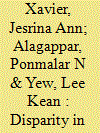| Srl | Item |
| 1 |
ID:
185959


|
|
|
|
|
| Summary/Abstract |
This article examines the effect of academic qualifications and networking ties towards the evolvement of micro, small-medium, and large ethnic Indian enterprises in Malaysia. The study is based in multicultural Malaysia, where certain policies were implemented in favor of one specific ethnicity. Research indicates that better academic qualifications through transgenerational succession affect how entrepreneurs form connections with their families, co-ethnic networks, and inter-ethnic networks to develop their businesses. This article explains that while micro and smaller firms are choosing to remain in their ethnic identity, medium and larger corporations are willing to shed their ethnic identity for the rapid growth of their businesses. A framework is built from the understanding of literature and past evidence on ethnic Indian entrepreneurship in Malaysia. This article demonstrates the disparities of Malaysian Indian businesses that have progressed differently over the generations, due to the impact of human and social capital.
|
|
|
|
|
|
|
|
|
|
|
|
|
|
|
|
| 2 |
ID:
160262


|
|
|
|
|
| Summary/Abstract |
This study grapples with two key puzzles: first, what happens when companies established as ethnic-based enterprises, including by migrants, are passed on to the next generation? Second, do these migrant businesses remain as ethnic enterprises after generational transitions? The empirical focus of this study is Malaysia, a country with one of the largest ethnic Indian populations outside India. To provide insights into these questions, this article pays particular attention to how an ethnic enterprise functions, in terms of types of goods and services produced and its targeted market, after the emergence of a new generation of owners with more class resources. The evidence from this study will provide insights into the validity of the concept of ethnic enterprise following a generational transition.
|
|
|
|
|
|
|
|
|
|
|
|
|
|
|
|